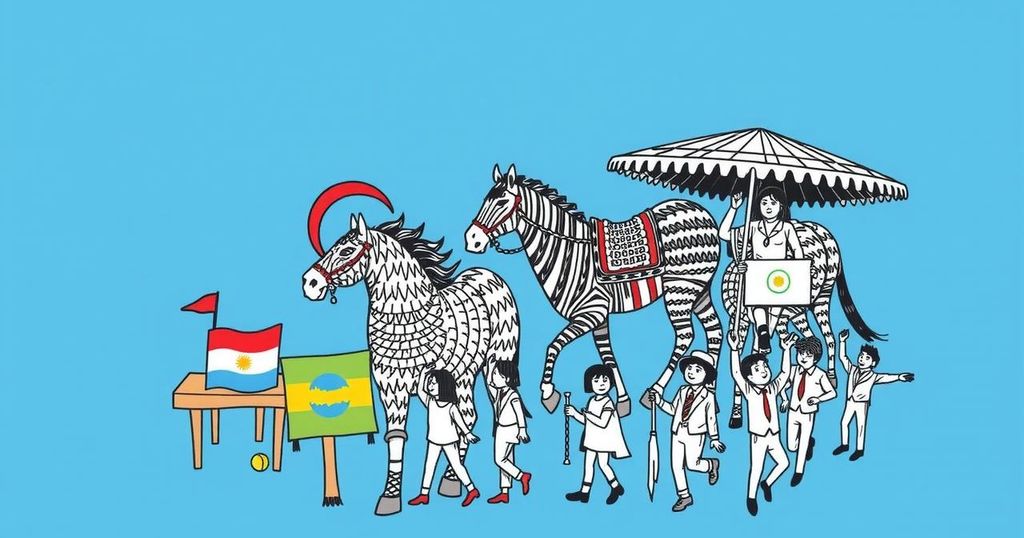Uruguay’s Lessons for Democracy: A Model of Civility and Progress

Uruguay exemplifies a model of civil political engagement, contrasting the polarization in Brazil and the U.S. Its recent elections were characterized by transparency and mutual respect. The new President Orsi plans to balance social welfare with a thriving economy. Uruguay’s social progress, led by figures like José Mujica, highlights the potential for governance free from extremism. Recognized for its low poverty levels, it serves as a trade partner for India and stands as an instructive example of effective, respectful politics in contrast to its larger neighbors.
Uruguay, despite its modest size, stands as a beacon of democratic integrity and civil political discourse, contrasting sharply with the current political climates in Brazil and the United States. The recent electoral campaign in Uruguay was marked by civility and transparency, devoid of the polarizing tactics, misinformation, and vitriol often observed in larger democracies. With prompt result announcements and a cooperative spirit between the winner and the defeated, Uruguay exemplifies the potential for democratic engagement free from extremes.
The nation has experienced a stable alternation of power between moderate and pragmatic political factions since the restoration of democracy in 1985, avoiding the divisive politics seen elsewhere. The incoming President, Orsi, aims to enhance social welfare while promoting a thriving private sector, highlighting his intent to pursue balanced domestic policies.
Former President José Mujica left a profound legacy of modesty and reconciliation. A former leftist guerrilla, Mujica emphasized distancing the left from outdated ideologies and outlined a progressive yet pragmatic approach to governance. His emphasis on personal integrity, community service, and economic inclusivity continues to inspire Uruguayan politics. Under Mujica’s influence, Uruguay legalized significant social reforms, including same-sex marriage and the regulation of cannabis, positioning the country at the forefront of social progress in Latin America.
Moreover, Uruguay boasts impressive economic metrics, characterized by low poverty and inequality levels compared to its regional neighbors. The small country is considered a crucial trade partner for India, ensuring substantial exports despite its limited scale. Although faced with larger geopolitical dynamics with Brazil and Argentina, Uruguay’s strategic initiatives and economic policies offer instructive lessons on governance and civil engagement.
In the broader context, Uruguay presents a valuable example to nations grappling with far-right extremism and societal divisions. The successful political climate in Uruguay reaffirms the prospect of governance rooted in respect and cooperation, setting it apart from the contentious political landscapes of Brazil and the United States. This demonstrates that it is possible to conduct politics effectively without resorting to hatred or divisive rhetoric, underscoring the viability of a progressive yet moderating influence on the region.
The democratic framework in Uruguay has remained relatively stable since the end of military rule in 1985. It has alternated between center-right and center-left political leadership, demonstrating a commitment to democratic norms and rejecting the extremes that have characterized politics in neighboring countries. The political climate emphasizes civility and respect, contrasting sharply with recent trends in polarized democracies such as those in Brazil and the United States. The phenomenon of a leftist leader like José Mujica, who embraced social justice while promoting market-friendly policies, exemplifies Uruguay’s unique approach to governance and social reform. Additionally, there is recognition of the country’s progressive legalizations in social policies and the active role it plays within the Mercosur customs union alongside larger neighbors.
In conclusion, Uruguay showcases the potential for civil and constructive political processes, offering a paradigm that contrasts with the extremism manifested in the political arenas of Brazil and the United States. The country’s recent electoral practices and the legacy of leaders like José Mujica exemplify how politics can thrive on mutual respect and pragmatism, promoting social welfare without hostility or divisiveness. As such, Uruguay serves not only as a model for effective governance but also as a timely reminder of the virtues of compassion and cooperation in politics, which are essential for sustaining healthy democracies.
Original Source: www.theweek.in








